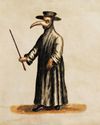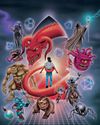
ORVIL RED FEATHER, the teenage protagonist of Tommy Orange's novel Wandering Stars, was just beginning high school when he was shot at a powwow in Oakland, California. The stray bullet that hit him made its way into his stomach and stayed there. Although he survived, his family-his two younger brothers; their great-aunt Opal Bear Shield, who raised them; and their recently resurfaced grandmother Jacquie Red Feather-is utterly changed by that moment of violence. To them, "it was as if the hole made in him that day brought a new world out from inside him," one that all five family members must now live in. It's around this time that Orvil is prescribed an opioid, hydromorphone, for his pain. The hole left by the bullet, he thinks, "felt open, and like something was coming through, out of it, asking something of me in return, like it needed to be filled, and here were these pills."
In Wandering Stars, a centuries-spanning epic of a Native family that manages to feel profoundly intimate, Orange writes about liquor, drugs, and even the ominously unlabeled pills that Orvil ends up taking (which he calls "Blanx") as an ambivalent force and goes to lengths to show why his characters intoxicate themselves and how right it can feel to them. Even when these substances cause harm, the path to addiction has a logic to it that's presented without judgment.
With a narrative that begins in the 1800s, the book shows us that addiction recurs through generations of Orvil's family-along with many other things: freckles, musical ability, bullets, a habit of making rubber-band balls, and the parts of Cheyenne belief and history that outlast the U.S. government's brutal efforts to assimilate Native Americans. The details of that national project of cultural genocide are something Orvil and his brothers are only vaguely aware of.
This story is from the February 26 - March 10, 2024 edition of New York magazine.
Start your 7-day Magzter GOLD free trial to access thousands of curated premium stories, and 9,000+ magazines and newspapers.
Already a subscriber ? Sign In
This story is from the February 26 - March 10, 2024 edition of New York magazine.
Start your 7-day Magzter GOLD free trial to access thousands of curated premium stories, and 9,000+ magazines and newspapers.
Already a subscriber? Sign In

LIFE AS A MILLENNIAL STAGE MOM
A journey into the CUTTHROAT and ADORABLE world of professional CHILD ACTORS.

THE NEXT DRUG EPIDEMIC IS BLUE RASPBERRY FLAVORED
When the Amor brothers started selling tanks of flavored nitrous oxide at their chain of head shops, they didn't realize their brand would become synonymous with the country's burgeoning addiction to gas.

Two Texans in Williamsburg
David Nuss and Sarah Martin-Nuss tried to decorate their house on their own— until they realized they needed help: Like, how do we not just go to Pottery Barn?”

ADRIEN BRODY FOUND THE PART
The Brutalist is the best, most personal work he's done since The Pianist.

Art, Basil
Manuela is a farm-to-table gallery for hungry collectors.

'Sometimes a Single Word Is Enough to Open a Door'
How George C. Wolfein collaboration with Audra McDonald-subtly, indelibly reimagined musical theater's most domineering stage mother.

Rolling the Dice on Bird Flu
Denial, resilience, déjà vu.

The Most Dangerous Game
Fifty years on, Dungeons & Dragons has only grown more popular. But it continues to be misunderstood.

88 MINUTES WITH...Andy Kim
The new senator from New Jersey has vowed to shake up the political Establishment, a difficult task in Trump's Washington.

Apex Stomps In
The $44.6 million mega-Stegosaurus goes on view (for a while) at the American Museum of Natural History.